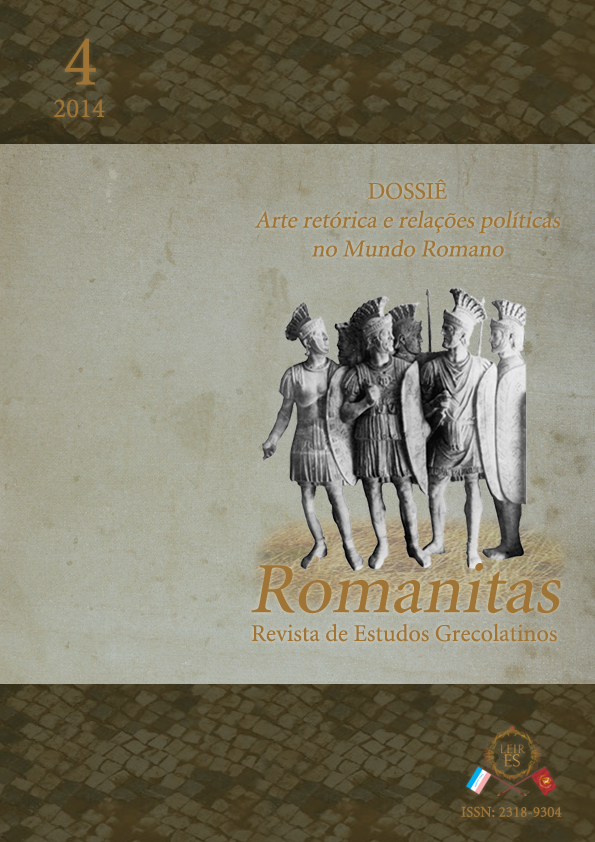O 'Moretum', a escravidão e o Principado
DOI:
https://doi.org/10.17648/rom.v0i4.9203Palavras-chave:
Moretum, Escravidão, PrincipadoResumo
Este artigo centra-se no poema Moretum, da Appendix Vergiliana. Os estudos sobre essa obra em geral priorizam aspectos de ordem literária, buscando qualificar seu estilo e relações com o gênero épico. Meu propósito é analisar o poema como um componente nas discussões sobre a escravidão no Alto Império Romano, que, por sua vez, se situam no contexto das tensões entre imperador e aristocratas quando da instalação do Principado.Downloads
Referências
Documentação primária impressa
APPENDIX VERGILIANA. Ed. M. G. Iodice. Milano: Mondadori, 2002.
PETRÔNIO. Satyricon. Edição bilíngue. Trad. Sandra Maria G. B. Bianchet. Belo Horizonte: Crisálida, 2004.
PLINY THE ELDER. Natural History. Massachusetts: Harvard University Press, 1952; 1963. v. VII, VIII.
SÊNECA. Cartas a Lucílio. Trad. J. Segurado e Campos. Lisboa: Fundação Calouste Gulbenkian, 1991.
TACITE. Annales. Paris: Les Belles Lettres, 1953. 3 v.
Obras de apoio
BLAIR, W. An inquiry into the state of slavery amongst the Romans from the Earliest Period till the establishment of the Lombards in Italy. Edinburgh: Thomas Clark, 1833.
BRADLEY, K. R. Slavery and society at Rome. Cambridge: Cambridge University Press, 1996.
BRAMBLE, J. C. Minor figures. In: EASTERLING, P. E.; KENNEY, E. J. (Ed.). The Cambridge History of Classical Literature. Cambridge: Cambridge University Press, 1996, p. 467-494.
BRYSON, N. Looking at the overlooked: four essays on still life painting. London: Reaktion Books, 1990.
CONNORS, C. Monkey business: imitation, authenticity, and identity from Pithekoussai to Plautus. Classical Antiquity, v. 23, n. 2, p. 179-207, 2004.
D’ARMS, J. H. Slaves at Roman convivia. In: SLATER, W. J. (Ed.). Dining in a Classical Context. Ann Arbor: The University of Michigan Press, 1991, p. 171-183.
DOUGLAS, F. L. A study of the 'Moretum'. New York: Syracuse University, 1929.
ELIAS, N. La sociedad cortesana. México: Fondo de Cultura Económica, 1996.
ÉVRARD, É. Quelques traits quantitatifs du vocabulaire du Moretum. Latomus, t. 41, fasc. 3, p. 550-565, 1982.
FAVERSANI, F. A pobreza no Satyricon de Petrônio. Ouro Preto: Editora da UFOP, 1999.
FAVERSANI, F. Estado e sociedade no Alto Império romano: Um estudo das obras de Sêneca. Ouro Preto: Editora UFOP/PPGHIS, 2012.
FITZGERALD, W. Labor and laborer in Latin Poetry: the case of the Moretum. Arethusa, v. 29.3, p. 389-418, 1996.
FITZGERALD, W. Slavery and the Roman literary imagination. Cambridge: Cambridge University Press, 2000.
GARNSEY, P. Famine and food supply in the Graeco-Roman World: responses to risk and crisis. New York: Cambridge University Press, 1988.
HABINEK, T. N. The politics of Latin Literature: writing, identity, and Empire in Ancient Rome. Princeton: Princeton University Press, 1998.
HAIRSTON, E. A. The Ebony Column: Classics, civilization, and the African American reclamation of the West. Knoxville: University of Tennessee Press, 2013.
HALEY, S. P. Be not afraid of the dark: critical race theory and Classical Studies. In: NASRALLAH, L. & FIORENZA, E. S. (Ed.) Prejudice and Christian beginnings: investigating race, gender, and ethnicity in Early Christianity. Minneapolis: Fortress, 2009, p. 27–49.
JOLY, F. D. Libertate opus est: escravidão, manumissão e cidadania à época de Nero (54-68 d.C.). Curitiba: Progressiva, 2010.
JOLY, F. D. Tácito e a metáfora da escravidão: um estudo de cultura política romana. São Paulo: Edusp, 2004.
JONES, C. P. Dinner theater. In: SLATER, W. J. (Ed.). Dining in a Classical Context. Ann Arbor: The University of Michigan Press, 1991, p. 185-198.
KENNEY, E. J. Moretum, a poem ascribed to Virgil: the ploughman’s lunch. Bristol: Bristol Classical Press, 1984.
KOLENDO, J. O camponês. In: GIARDINA, A. (Org.), O homem romano. Lisboa: Presença, 1991, p. 169-178.
PITA, L. F. D. O cotidiano do trabalhador romano segundo o Moretum. Revista Tessituras, v. 1, p. 1-9, 2010.
RAND, E. K. Young Virgil’s Poetry. Harvard Studies in Classical Philology, v. 30, p. 103-185, 1919.
RODRÍGUEZ-PANTOJA, M. El Moretum, estudio lingüístico y literário. Habis, v. 8, 1977, p. 117-148.
ROLLER, M. Constructing autocracy: aristocrats and emperors in Julio-Claudian Rome. Princeton: Princeton University Press, 2001.
ROSS, Jr., D. O. The Culex and Moretum as Post-Augustan literary parodies. Harvard Studies in Classical Philology, v. 79, p. 235-263, 1975.
SCHUMACHER, L. Sklaverei in der Antike: Alltag und Schicksal der Unfreien. München: Beck, 2001.
SNOWDEN, F. M. Before color prejudice: the ancient view of Blacks. Cambridge: Harvard University Press, 1983.
SNOWDEN, F. M. Blacks in Antiquity: Ethiopians in the Greco-Roman experience. Cambridge: Harvard University Press, 1970.
STEELE, R. B. The authorship of the Moretum. Transactions and Proceedings of the American Philological Association, v. 61, p. 195-216, 1930.
TODD, O. J. The Authorship of the Moretum. Classical Philology, v. 20, n. 4, p. 336-340, 1925.
ZIOLKOWSKI, J. M.; PUTNAM, M. C. J. (Ed.). The Virgilian tradition: the first fifteen hundred years. Yale: Yale University Press, 2008.
Downloads
Publicado
Edição
Seção
Licença
Copyright (c) 2015 Romanitas - Revista de Estudos Grecolatinos

Este trabalho está licenciado sob uma licença Creative Commons Attribution-NonCommercial-NoDerivatives 4.0 International License.
a. Os autores mantêm os direitos autorais e concedem à revista o direito de primeira publicação.
b. Os autores têm autorização para assumir contratos adicionais separadamente, para distribuição não-exclusiva da versão do trabalho publicada nesta revista (ex.: publicar em repositório institucional ou como capítulo de livro), com reconhecimento de autoria e publicação inicial nesta revista.
c. Autores têm permissão e são estimulados a publicar e distribuir seu trabalho online (ex.: em repositórios institucionais ou na sua página pessoal) após a primeira publicação pela revista, com os devidos créditos.
d. Os textos da revista estão licenciados com uma Licença CC BY 4.0 Deed Atribuição 4.0 Internacional (CC BY).

























